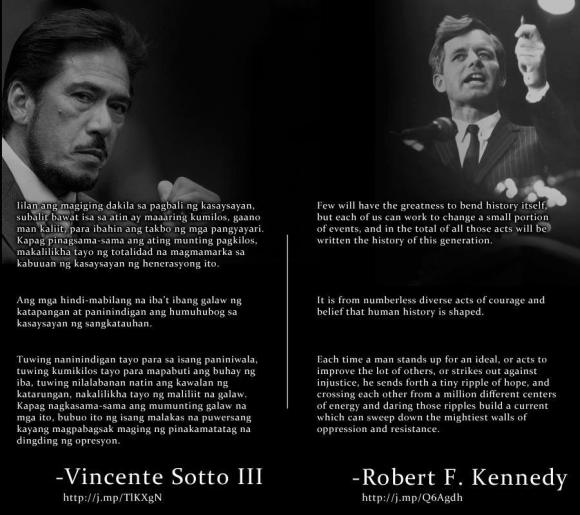Filipinos expressed their displeasure on all media channels against the Cybercrime Prevention Act of 2012. The law, officially approved on September 12, 2012 and took effect at the start of October, aims to outlaw cyberbullying, cybersquatting, and cybersex off Philippine online media. This means that no more leaked videos of sex scandals and inadmissible content that destroy reputations, if not lives.
Although the law means well, the overwhelming outcry against the Act sings the same tune — it inhibits the country’s foundations of democracy and right to free speech. For every Katrina Halili or Rhian Ramos that were wronged (in a sense), there are people like Sen. Vicente Sotto III, who mistook online criticisms hurled his way as a personal vendetta. His speeches in the Senate about the Reproductive Health bill were lifted from five bloggers and a briefing paper. Instead of releasing an apology to move on from this blunder, Sen. Sotto stood his shaky ground and fought off his dissenters with even more flawed arguments:
They must be mistaken. What I delivered in the plenary is different from the one that was written,
Sotto said in a telephone interview.
I have an umbrella attribution [in my speech]
he added, referring to his disclaimer that what he said on the floor was based on research and not his own.
Sotto also referred to Article 6 Section 11 of the Philippine Constitution which says in part:
No member [of Congress] shall be questioned nor be held liable in any other place for any speech or debate in the Congress or in any committee thereof.
Why would I quote from a blogger? She is just a blogger, Sotto said.
Villacorta said he saw nothing wrong with using Pope’s blog without any attribution because it is “public domain” and “blogs are not covered by copyright.” He added, “It is a new media and there is no jurisprudence yet.”
On November 9, a meme broke out that shows one of the speeches made by Sen. Sotto in front of the Senate regarding the RH Bill. The verbatim speech was put beside one of the Robert F. Kennedy’s speeches in 1966. People who understand both languages will read that Sen. Sotto merely translated Kennedy’s speech into Tagalog, further fanning the flames of criticisms against the Filipino senator. Although Sen. Sotto has already filed a public apology, the Kennedy family found it insufficient because the apology was not in connection to his “alleged” plagiarism.

On November 9, a meme broke out that shows one of the speeches made by Sen. Sotto in front of the Senate regarding the RH Bill in its native language. The verbatim speech was put beside one of the Robert F. Kennedy’s speeches in 1966. People who understand the English and Filipino language will find that Sen. Sotto merely translated Kennedy’s speech into Tagalog, further fanning the flames of criticisms against the Filipino senator. Although Sen. Sotto has filed a public apology, the Kennedy family found it insufficient because the apology was not directed to his “alleged” plagiarism.
Things only went downhill from there as Sen. Sotto, who was receiving nasty tweets and wall posts from the public, helped provision libel to the Cybercrime Law. This puts every social media user subject to punishment if whatever they posted or tweeted have offended or cast a person in a bad light. The provision is what triggered the ire of Filipino online users — it was not only an attack on free speech, but it also rekindled the memories of Martial Law some decades ago when the government suppressed, brutalized, and killed people who had an unfavorable opinion about the country.
People fired back and let their displeasure be heard at what became known as the eMartial Law. Facebook profile pictures were changed to black, protest rallies were held, and antiCybercrime Law intellectuals tried to engage an argument with the Senate in their attempt to put some sense in the minds of the misguided officials.
Implications
Eventually, after 15 petitions that were filed against the law, the Philippine Supreme Court suspended the Cybercrime Prevention Act of 2012 on October 9, 2012. Although the government’s attempt to douse the basics rights of Filipinos were thwarted, it would only be a matter of time before they come up with something as preposterous as the Cybercrime Law to once again rankle the public. But before the government can come up with any other form of “attack” in the future, here are some things that everybody must consider in the now.
Make Ingenious and Affordable Commodities To Combat Piracy
Piracy is rampant because of a simple reason — it’s a cheaper alternative. It all started with Napster, the little filesharing program that could and did. It provided an alternative for music lovers to obtain copies of record albums at no costs at all. Although downloading an album through Napster is illegal, let’s face it: if you could get away with downloading your favorite records for free instead of paying $14US for each, why wouldn’t you do it?
The unbelievable love story between Napster and online users came to end when heavy metal’s master Metallica, whose single “I Disappear” off M:I2’s soundtrack was leaked by users on the filesharing tool, stepped in. Along with other record selling artists like Dr. Dre and Madonna, they managed to shut down Napster as a free service in 2001.
While record labels celebrated their seeming triumph over free media on the internet, Napster was only the calm before the storm. Filesharing programs such as Limewire, Kazaa, and Soulseek continued where Napster left off — to provide an avenue for users to share free music and movie downloads to others for free. Eventually, these client programs went under as well due to copyright infringements of the distributed files. However, a more sophisticated form of file sharing practice, a protocol known as BitTorrent, help proliferate piracy under the guise of the file sharing banner, which continues to plagues record labels and movie distributors worldwide.

Wait a minute, didn’t these guys become popular in the ’80s through tape trading, which is equivalent to file sharing in today’s generation? Image taken here.
The Philippine government can learn from this internet drama that has been raging on for decades. It’s just a matter of accepting the fact that piracy will always bite them from behind and that affected companies come up with new ways to combat piracy by innovating their products and services.
People aren’t stupid, just practical. They can discern the difference between a $30US Bluray disc and a free digital copy of the same title. Consumers are motivated by different reasons that dictate their choices, but it would help if record labels make even more affordable alternatives than the traditional formats. Selling digital copies of songs and movies on the cheap on iTunes is a nice touch, although movie producers are still finding it difficult to settle on a competitive price for all.
As the saying goes, if you can’t beat them, change.
You Can Never Tame A Wild Beast
The internet remains an open cesspool of readily available good and bad sites. For every online news outlet or non-government org site out there trying to make a change, there are hundreds of free porn and hate sites that can be searched using the right keywords on any search engine.
Chinese are robbed of access to true information with Google China.
This also applies to politically driven attempts to pacify the kinds of content people can view locally. Google China was established to comply with the internet censorship laws in the country. This means that any Chinese searching for accurate information about “Tiananmen Men” or “Tank Men” on Google China would yield different results than on an unfiltered Google search.
This provision received lots of criticisms and ran in conflict with Google’s motto – “Don’t be evil.” However, what made Google withdraw the censorship from search results on Google China in 2010 was when hackers breached Gmail accounts of Chinese human rights activists. The breach was for the purpose of obtaining pertinent information about encryption and intellectual property. However, the hackers ended up obtaining email addresses from the breached accounts instead.
The acrimony between Google Inc. and China continues to this very day, which is a testament to how any attempt to inhibit freedom (in this case, freedom of accurate information) will be difficult, if not impossible, to maintain. Point is, there will always be conflicting interests from different parties, legal or not, in this online playground. And sadly, regardless of how much red tape you wrap around each other, all is fair game on the internet.
Take Real Action
If there’s anything that people should learn about the whole Cybercrime Law debacle, it’s that people should learn how to conduct themselves properly online. Although there is an argument to believe that Sen. Sotto deserved all the damaging posts that he received from people, it would be better to stage dialogues instead of diatribes.
Instead of spewing out hateful comments, why not follow the lead that academic Leloy Claudio and writer Miguel Syjuco paved by challenging Sen. Sotto to a public debate about the RH bill? The Senator has declined their request, but their point has been made clear. If our attempt is to challenge a belief, we need to present it in a medium where reason and fairness will prevail. Posting messages on the internet with the intention of just making noise would only aggravate the situation.


